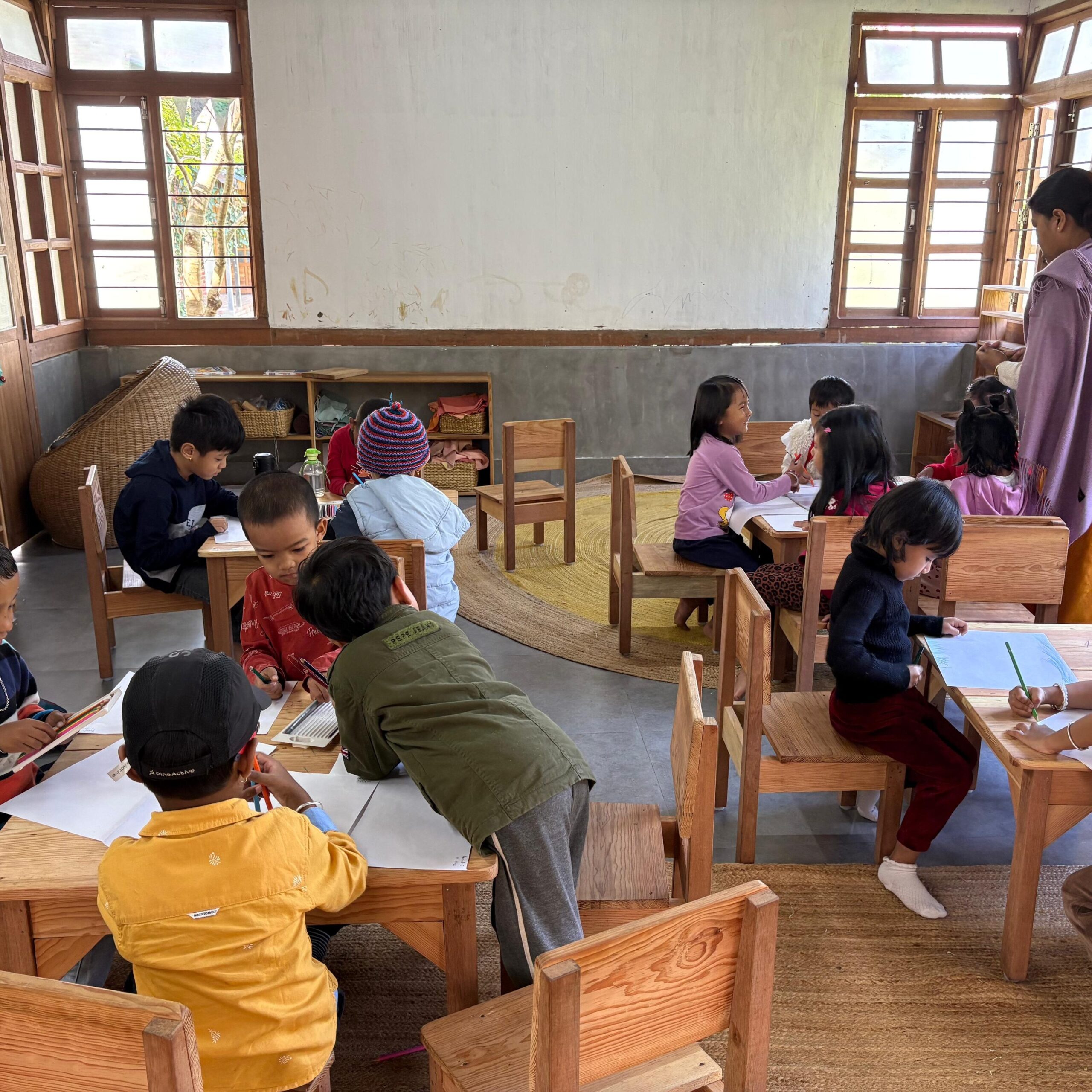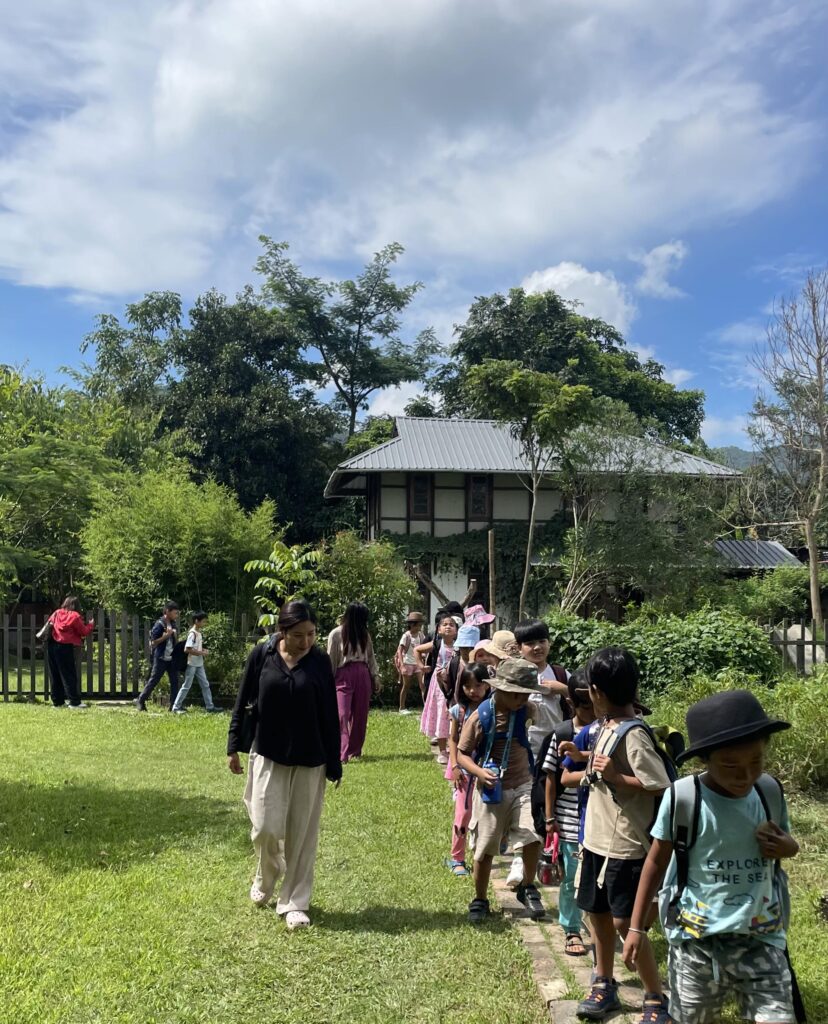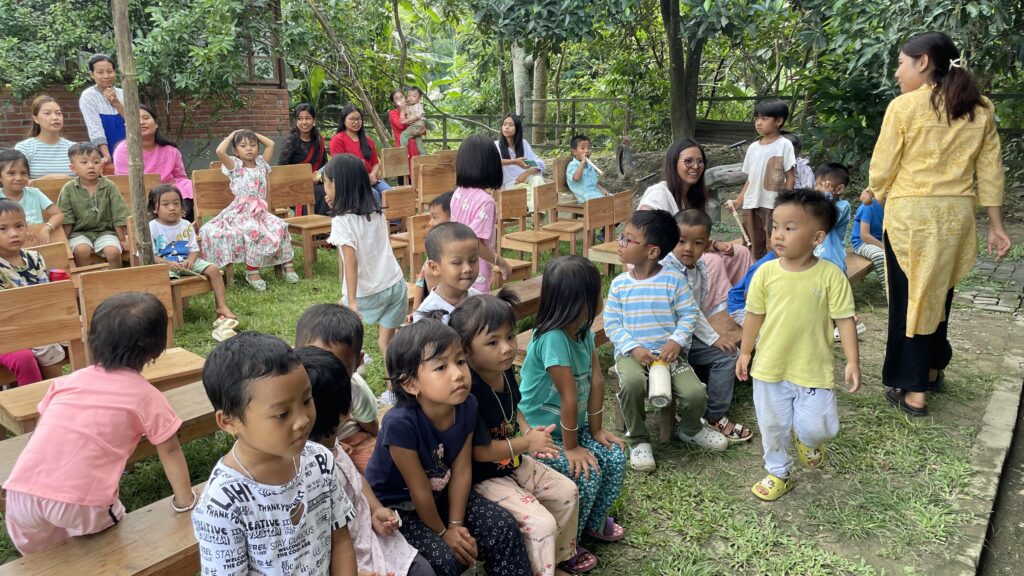Kindergarten program features



Our play-based kindergarten (preprimary) program is designed to provide children a loving and safe environment immersed in nature where they are gently guided to realise skills and abilities appropriate to their burgeoning age. Our pre-academic program is built on a foundation of Waldorf education and incorporates features derived from our own practice and other notable approaches.
This program is spread across three classes – Pre Kindergarten for 2.5 to 3 years old, Junior Kindergarten for 4 years old, and Senior Kindergarten for 5 years old (effective from 2026-27 session). The Pre KG class follows the rhythms and activities of a classic Waldorf Kindergarten – focusing on physical, social and emotional development. Junior KG follows similar rhythm but the activities and text children engage with are more varied and starts to engage orally with numbers and phonemes. Senior Kindergarten prepares students for imminent formal instruction in English language, basic math, and geometry through guided form-drawing, discussions, songs, verses, activities and games. Our Kindergarten Program lasts from 9:00 am – 12:30 pm.
The following are the salient features of our Waldorf based kindergarten program:
RHYTHM
Rhythm plays an important role in the Waldorf curriculum. A yearly rhythm is followed taking cues from the seasons and local festivals. A weekly rhythm as well as a day rhythm is also followed to give the children a sense of trust and security. Everything in nature follows a rhythm. Everything in nature that thrives follows a healthy rhythm. We want our children to thrive and realise their full potential. Waldorf education is said to be a healing education and rhythm plays an important part in making it so.
STORY TIME
Story-telling invites children to develop mental pictures and to engage the whole self in active listening. In the process, children transform words into reality. Stories of archetypal human experiences help guide the children’s moral compass, as well as, their ability to understand and overcome challenges, and relate to others. Listening to stories helps children to learn attentiveness which is a pre-requisite for academic learning in the future.
ARTISTIC ACTIVITIES
Children engage in beeswax/clay modelling, wet-on-wet watercolour painting, crayon drawing, finger knitting, beading, weaving, simple embroidery, pickle making, bread making, and simple cooking. Senior kindergarten children do handwork projects that require more effort and patience. These activities develop not only fine motor skills, eye-hand coordination and focus but also perseverance which is rewarded with a project’s completion. Activities are also important learning opportunities in Junior KG and Senior KG to work on pre-academic skills detailed below.
FREE PLAY
Play is at the centre of our Kindergarten. Through play, children not only learn gross and fine motor skills but it also presents them with opportunities to learn emotional and social skills. Imagination in free play is an important way for children to hone their creativity – in expression and in problem solving. They play in our thoughtfully created play gardens with natural props and indoors with handmade toys and open-ended materials. Play is also an important medium for children to digest the things they are exposed to in their day-to-day environment which they are yet unable to process. Through play, they try to make sense of the events happening around them and resolve their thoughts about them. It is best to leave children at their free play and not impose any structure or an adult’s own imagination through instructions. Else play becomes an instructional activity where the children just do what they are instructed. There is a space for instructional activities as well. But free play is unique because of the cathartic effects it has on children and it should be left at that. Play to children is what art therapy is to adults.
CIRCLE TIME
Circle time is a special time when the oneness of the class is manifested physically and spiritually. The kindergarten teacher leads the circle in activities involving singing, verses of reverence, meditation, play, and movement. It strengthens memory, spiritual sense, spatial awareness, and social awareness. Along with the teacher, children also learn and perform “Finger Rhymes” – verses enacted using finger movements with a range of complexity. It helps children acquire finger dexterity, a much needed skill before they start writing. Circle time in Junior KG and Senior KG includes working on pre-academic skills detailed below.
HOUSEKEEPING
The kindergarten teacher creates an environment that gives children the opportunity for rewarding purposeful work. Our activities include cooking, cleaning, organising and gardening. A sense of community is also inculcated in such work by working together towards a shared goal.
MUSIC
Music is seamlessly woven in all the activities and in the transitions as a gentle guide. The children sing and hum all day as they go through the various sessions. It fosters musical appreciation and sense of rhythm while also creating a soothing environment.
NATURE AND OUTDOORS
Many activities take place in our lawn and gardens among trees, vegetables, water and earth. Such environment fully engages the senses and allows for adaptability, and opportunity to take risks. Children also go on regular nature walks along the magnificent water bodies of Luwangsangbam, beside Matai hills, in paddy fields, and many other inspiring sites in Matai village. Such opportunities help children realise their oneness with nature and hone their observation skills as well.
PRE-ACADEMICS IN JUNIOR KG AND SENIOR KG
Junior KG and Senior KG classes gradually builds focus on key academic skills with a more structured and guided approach. This approach is informed by the potential of oral learning – laying foundational understanding of phonemes, numbers, mental math, etc. before children start engaging with encoding and decoding written symbols. They are introduced to appropriate aspects of English language, basic math, and geometry through songs, verses, activities, discussions and games. Early playful interaction with these concepts cultivates curiosity and prepares children for formal instruction when they graduate to Class 1.
A NOTE ON ELECTRONIC MEDIA DEVICES
While computers are essential tools in our modern era and we recognise their importance, the Waldorf approach holds that premature exposure to computers, video games, television, and other screen time contributes to many of the attention, learning, and behavioural issues common in today’s children. Scientific research has also come up which indicates that electronic media can have detrimental effects on a young child’s healthy growth and development.
We expect our students to eventually engage with computers later in their academic careers and lives. But in kindergarten and lower elementary level we build a rich foundation for children by providing a loving world of nature, face-to-face interaction, and experiences where they can learn to build meaningful relationships. We strongly feel that nature and human interaction shouldn’t be replaced or compromised by electronic media. The formative years of children are spent trying to makes sense of the world that they are born in – nature, and forming lifelong bonds with other human beings – meaningful human interactions. Parents are advised to cooperate in extending this environment to their homes as well by practicing regular healthy eating and sleeping rhythms and by keeping children away from electronic media devices.

We are accepting early admissions for our Kindergarten program
Our next academic session starts in April 2026. We are currently accepting early admissions in all classes for the next session subject to availability of seat.
Apply at the admission page.